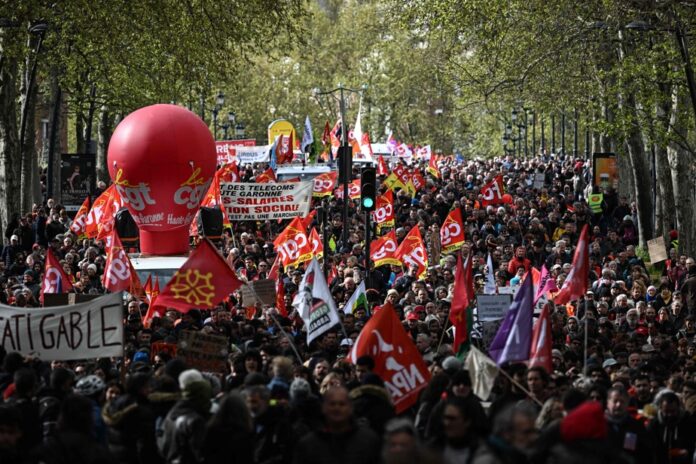(Paris) Back in the streets Thursday for a twelfth day of demonstration against the pension reform, the opponents were fewer, but still determined, on the eve of the crucial decision of the Constitutional Council.
After almost three months of social conflict, the mobilization is showing signs of running out of steam. In several major cities, police and union numbers are the lowest since March 11, the previous low point in the movement.
This is particularly the case in Toulouse (9,000 according to the police, 70,000 according to the unions), Nantes (10,000 to 25,000), Rennes (6,500 to 15,000) and Clermont-Ferrand (6,000 to 10,000).
In total, the authorities expect between 400 and 600,000 people in the streets, compared with the 570,000 identified on April 6 and 740,000 on March 28.
Despite this ebb, “the challenge to this reform is still just as strong,” said Laurent Berger before the start of the parade in Paris. For the boss of the CFDT, “the union fight is far from over”, whatever the verdict of the Constitutional Council, expected Friday at the end of the day.
The object of all attention, the institution housed in the Royal Palace, in the heart of the capital, is under close surveillance. Thursday morning, a brief blockage, with trash cans and smoke bombs, resulted in four arrests.
Located on the route of the Parisian procession, which left at 2:30 p.m. from the Place de l’Opéra in the direction of that of the Bastille, the place and its surroundings will be prohibited to any demonstration from Thursday evening and until Saturday morning, indicated the prefect of police. A rally is scheduled for Friday at the end of the afternoon on the forecourt of the Town Hall.
“The Constitutional Council has a right to serenity,” said government spokesman Olivier Véran.
For the demonstrators, this twelfth march “is a kind of last stand”, summarizes Martine Girard in Marseille. “Even if there is little hope, we want to show that we are not fooled”, explains this 50-year-old teacher, who recognizes that there are “a lot fewer people mobilized because financially it becomes hard “.
In fact, the strikers were few, especially in education where the ministry identified about 5% among teachers in areas not yet on vacation. Blockades of high schools and universities took place in Lille, Paris and Strasbourg.
Few disruptions also in transport, with three out of five TERs and four out of five TGVs in circulation, and slightly disrupted metro and RER traffic in the Paris region. In the air, the cancellation of 20% of flights to Nantes, Bordeaux and Toulouse, did not prevent delays of one to two hours observed at the start of the afternoon.
A punch action also targeted the Parisian headquarters of the luxury giant LVMH, in the Champs-Élysées district, briefly occupied by demonstrators.
Dams have also hindered access to emblematic industrial sites such as the Feyzin refinery (Rhône), the Gravelines nuclear power plant (North) and the Ivry incinerator (Val-de-Marne).
In the capital, where the garbage had not been collected for three weeks in March, a new renewable strike of the garbage collectors began Thursday at the call of the CGT.
“Contrary to what the government hopes, the movement is far from over,” said CGT number one Sophie Binet, leading the Paris protest.
In the absence of a total censorship of the reform, the unions hope that the Constitutional Council will cancel part of it, which would strengthen their arguments in favor of a suspension or a withdrawal.
For President Emmanuel Macron, “the country must continue to move forward”, he said on Wednesday, from Amsterdam where he was visiting, offering the unions an “exchange which will make it possible to initiate the continuation”.
“We will first give him 15 days of reflection to request a new deliberation or decide not to apply the law”, reacted the secretary general of Force Ouvrière, Frédéric Souillot.
A “period of decency” also demanded by Laurent Berger, who is already planning for “major popular demonstrations on May 1”.
Opponents of the reform are also counting on the validation by the Constitutional Council of the referendum of shared initiative (RIP) launched by the left, which could give a new breath to the challenge.
“If we don’t have at least the RIP, then social anger will be very strong,” warned CFTC President Cyril Chabanier.
The union leaders will meet on Thursday evening to prepare their common reaction to the different scenarios, depending on the verdict of the “Wise Men”.


















